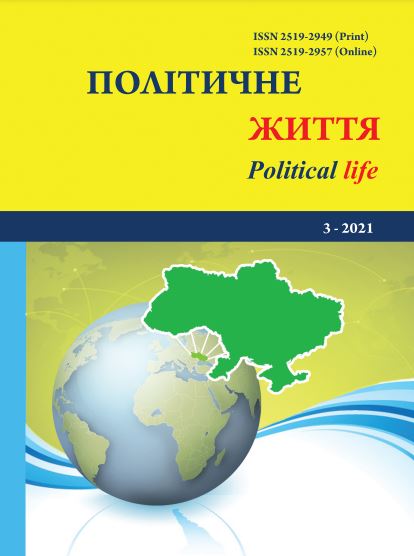Modern Democratization Processes in Hungary
DOI:
https://doi.org/10.31558/2519-2949.2021.3.2Keywords:
Hungary; democratization; power; opposition; political parties; divergence; convergenceAbstract
With the help of special indicators, the dynamics of democratization in Hungary has been studied out. For the trend dynamics of the political system’s democratization reproduced in the model form, the periods of fluctuation with its main phases – divergence and convergence have been specified. The defining points, which proved the discontinuation of the democratization process have been fixed. The combination of group and individual conversion strategies of political leaders gave the possibility to influence the vector of democratization at maximum.
We have discovered an unfinished cycle of fluctuations, which manifested itself in the trend towards the convergence of democratization of the Hungarian political system. Fluctuation took place rather slowly and unnoticed by most voters due to their low level of political culture and low level of conventional participation. Based on the analysis of indicators and modern political process in the country, it has been established that the discontinuation of democratization had chronologically coincided with the dominance of the Fidesz party in the political field. At the same time, the political field had one significant political pole while its other part was unstructured. It has been proven that the ruling Fidesz, in order to actively mobilize voters, had identified itself with a democratic force, embracing democratic ideas, rules, and procedures, however only imitating play according to democratic rules. The amplifying effect was obtained due to specific endogenous factors, like populism, nationalism, Euroscepticism. It has been proven that the general goal of the political field’s agent was not to establish a stable balance between political forces as a condition of democratization but to deepen the conflict with opponents by narrowing inter-party competition. The Hungarian case has been examined as contradictory, unstable, and ineffective in terms of respect for rights and freedoms, inter-party competition, and with no noticeable positive trends in the quality of democracy.
References
Бялоблоцький З. Стабільність та ефективність урядів у політичних системах країн Східної Європи: монографія. Львів: ЛНУ імені Івана Франка, 2013. 470 с.
Levitsky S., Way L. The New Competitive Authoritarianism. Journal of Democracy. Vol. 31, No 1. 2020. January. P. 50 – 65.
Остапець Ю. Партійна система Угорщини. Еволюція партійних систем країн Вишеградської четвірки: досвід для України. Колективна монографія. Ужгород: Центр інформаційно-видавничої діяльності ЗІППО, 2014. С. 134–154.
Корнійчук Т., Куса І. Що таке «неліберальна демократія» і як її запроваджують в Угорщині? Незалежний культурологічний часопис «Ї». URL: https://hvylya.net/analytics/politics/shho-take-neliberalnademokratiya-i-yak-yiyi-zaprovadzhuyut-v-ugorshhini.html (дата звернення: 13.12.2018).
Bertelsmann Transformation Index. Country Report. Hungary. 2018. URL: https://www.btiproject.org/fileadmin/files/BTI/Downloads/Reports/2018/pdf/ BTI_2018_ Hungary.pdf (Last accessed: 17.01.2019).
Freedom House. URL: https://freedomhouse.org/report/freedom-world/freedom-world-2003 (Last accessed: 21.09.2019).
Kaufmann D., Kraay A., Mastruzzi M. The Worldwide Governance Indicators. Methodology and Analytical Issues. 2017. URL: www.govindicators.org (Last accessed: 15.07.2020).
Worldwide Governance Indicators. URL: https://info.worldbank.org/governance/wgi/ Home/Reports (Last accessed: 16.11. 2019).
Török G. The Political system in Hungary in political systems of Visegrad Group countries / S. Balik, W. Gizicki V. Hloušek, J. Holzer, G. Török, J. Marušiak / ed. W. Gizicki. University of Ss Cyril and Methodius in Trnava, 2012. P. 43 – 70.

